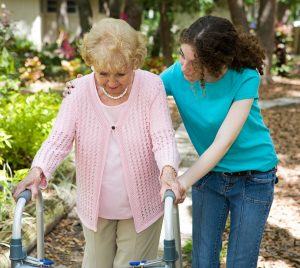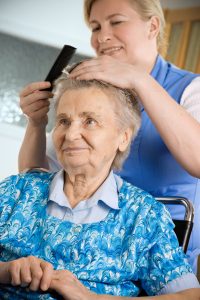Becoming a Caregiver: What to Know About Senior Living & How to Help
The increasing lifespan of seniors has been a nationwide conversation for years. Medicare, social security, pensions and questions of their viability have been brought to the fore front, prompting many seniors to ask—can I afford to live 10, even 20 more years?
The conversation on aging shouldn’t, and doesn’t, stop there. The fact is, many seniors can’t afford their monthly prescriptions, they can’t afford assisted living care, and they cannot afford basic living expenses. And so, they rely on you, their grown children to help them survive.

Photo Credit | Deposit Photo | © lisafx
The Sandwich Generation — the unrecognized, silent support system of our aging populace. This generation is metaphorically “sandwiched” between caring for their aging parents and their own children simultaneously, leaving little time to enjoy life. The Sandwich Generation lends support in many ways, as full time caregivers and/or as primary financial supporters. So, it’s important that to communicate with your doctor to recognize and learn ways to work with elderly patients’ adult children as family members and as caregivers.
Sandwich “Generation-ers” often have little, if any medical training when taking on the role of head caregiver for your parents. You need to learn to care for them by going to doctors’ appointments with Mom or Dad, researching on WebMD or Mayo Clinic. So, what’s the takeaway? It’s important to educate yourself, the caretaker.
To lessen your anxiety, research referrals regarding caregiver services, read literature about being a caregiver and go to a “first aid sessions for seniors” seminar — learn. Create an open dialogue with your parents’ doctor during their next appointment. Go with Mom or Dad to an appointment and ask the doctor what symptoms you’ve noticed, and tell him about any change in your parent’s condition. Although getting a second opinion is time consuming, it gives you more information about your patient’s condition, and makes you feel a part of the conversation, too.

Photo Credit | Direct Deposit | © alexraths
Also, take time to ask the questions concerning your parent to the doctor. Make sure the doctor answers them honestly. As the grown child, you are the first line of defense for your parents, especially as seniors become more forgetful. Therefore, it’s important that you fully understand diagnoses, conditions, medications, etc. so you can monitor your parents’ conditions.
Most importantly, as stated above, ask your doctor to be honest with you—you are family, but you are also caretakers. You need to know what is best for your parents both medically and emotionally speaking. Although this may seem simple, many physicians do a disservice to patients and their families if they sugarcoat reality. If it’s time for the family to consider assisted living for Mom or Dad, find out.
While assisted living is unpopular, the doctor can help make this option seem more appealing by confronting your family’s fears head-on. Families worry whether their loved ones will get the proper care. This isn’t the only thing stopping families from placing elderly parents in care facilities. Many fear the moving and transition process that accompanies this decision. Set up a “senior services” meeting with your doctor, ask for pamphlets that discuss what options they have for full-time care, how the transition process works, resources for transitioning such as senior move managers, etc.
It’s just as important for you, the grown adult child to face the changing landscape of senior care as it is for the senior. Realize, if you haven’t already, that this is a new age in which grown adults are ever-present in their elderly parents’ lives. You must learn to work with them in order to provide the best care for your elderly parents.
For more information on caregiving, check out this website for the top 26 Resources for Family Caregivers.
This article may be all about becoming a caregiver, but if you feel it is too much, it is OK to hire a caregiver to help. Do not feel like you are giving up; know that you are accepting help to lessen the anxiety and stress you have been overwhelmed with, because in the end it could help both you and the senior you are caring for. Below are a few sites that you could try.
o https://www.carelinx.com/
o https://www.homeinstead.com/home-care-services
o http://www.caregiveraction.org/resources/agencies/